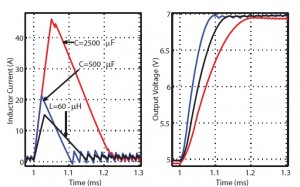Time-Optimal Control of DC-DC Converters
Santanu Kapat, Post-Doctoral Researcher, with adviser P. T. Krein

Figure 27: Transient response of a buck converter for a step change in reference voltage from 5 V to 7 V: (a) L = 40 μH, C = 500 μF (blue line), (b) L = 40 μH, C = 2500 μF (red line), and (c) L = 60 μH, C = 500 μF (black line).
Achieving fast transient performance remains a challenging control problem for future power supplies, especially for low-voltage-high-current applications. This work applies a geometric approach to achieve minimum-time transient recovery in dc-dc converters. The conditions of time optimality subject to a step change in load current, input voltage, or reference voltage are obtained analytically for buck and boost converters. These conditions are shown to be sensitive to the system parameters as well as non-idealities in the inductor current and output voltage, in contrast to parameter insensitive control. The degree of parameter sensitivity is inversely proportional to the separation in the time scales. Following are strategies shown to obtain robust performance with uncertain parameters.
First, time-optimal control for disturbance recovery is associated with one switching action. We have analytically formulated the expression of current overshoot for achieving single-switching (minimum-time) disturbance recovery for a step change in load current, input voltage or reference voltage of a buck converter. This approach was extended to a boost converter to formulate the conditions of time optimality. We observed that a system’s characteristic impedance plays a significant role in the time optimality, which was unexplored earlier. Presently, we are working towards experimental validation of the analytical behaviour. Figure 27 shows the effect of variation in the system parameters in time optimality for a step change in the reference voltage of a dc-dc buck converter.
This research is supported by the Grainger Center for Electric Machinery and Electromechanics.